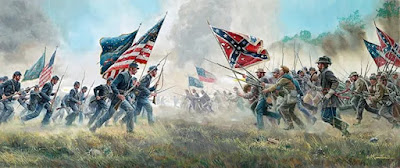It is said that during the Civil War, two large armies were on opposite banks of a river in Virginia. Late one afternoon, just before sunset, the Confederate band played' "Dixie," that favorite song so dear to every Southern heart. At the close loud shouts of exultation went up from thousands of gallant Confederate soldiers. Immediately, the band of the Union Army played "Yankee Doodle," equally a favorite song of the federal soldiers. When it ended, the voice of thousands brave Union soldiers burst forth in applause. In a few moments both bands, simultaneously, struck up "Home, Sweet Home," and when the last sweet strains of music died away, tears were flowing freely from the eyes of thousands of war-worn and battle-scarred veterans of both armies. It appealed to the voice of conscience, and brought to them the remembrance of other and better days.
The song, "Dixie," aka "I Wish I Was in Dixie," was written in 1859. It cemented the word "Dixie" in the American vocabulary as a nickname for the Southern United States. During the Civil War, it was a rallying song of the Confederacy, a national anthem. Abraham Lincoln loved it. It was played at the announcement of General Robert E. Lee's surrender.
In 1906 in Wayne County, Kentucky, a crowd of around 2,500 people were assembled at the fairgrounds to attend the 4th of July Celebration, which was given by the Wayne County Fair Association. Interesting and patriotic orations were delivered in the forenoon by Judge John P. Hobson, a member of the Court of Appeals, and Wayne County Judge Joseph Bertram. The Outlook reported that the music for the occasion was furnished by the Monticello Brass Band. "To say that they did well would be putting it lightly, considering the time that they have practiced, they did exceptionally well. The only fault we find with them is that they don't play "Dixie" enough. They should play it every other time, at least. It was the only tune that received an applause. It stirs the southerners heart as nothing else can."
"I wish I was in Dixie
Hooray, Hooray!
In Dixie land, I'll take my stand
To live and die in Dixie!
Away, away, away down South in Dixie!
Away, away, away down South in Dixie!"
"Yankee Doodle" predates the American Revolution, originally sung by British soldiers to mock the disheveled, disorganized colonial Yankee who, they said, thought that he was stylish if he simply stuck a feather in his cap. It became popular among the Americans as a song of defiance. Verses were added that hailed George Washington as the Commander of the Continental army. By 1781, "Yankee Doodle" turned from being an insult to being a song of national pride. It was played at the British surrender at Saratoga in 1777.
"Yankee Doodle went to town
A-riding on a pony,
Stuck a feather in his cap
And called it macaroni,
Yankee Doodle keep it up,
Yankee Doodle dandy,
Mind the music and the step,
And with the girls be handy."
"Home Sweet Home" was written in 1823. It was a favorite of both Union and Confederate soldiers during the Civil War. That night in Virginia, in the words of Frank Mixson, a private in the 1st South Carolina Volunteers, "Everyone went crazy during the playing (and singing) of "Home Sweet Home."Both sides began cheering, jumping up and down and throwing their hats into the air. Had there not been a river between them, he said, the two armies would have met face to face, shaken hands, and ended the war on the spot.
"Mid pleasures and palaces,
Though I may roam,
Be it ever so humble,
There's no place like home.
Home! Home!
Sweet, sweet home!
There's no place like home!
There's no place like home!"
In his 1905 essay entitled, "Fourth of July, The Birthday of the United States of America," school teacher Samuel L. Coffey wrote in the Adair County, Kentucky newspaper, "The American flag is the emblem of national unity and strength, a nation whose strength lays in the conscience of its people and whose perpetuity depends on the virtue, the intelligence, and patriotism of its people. Thomas Jefferson said "Where liberty dwells, there is my country." Every true American citizen should be able to say, "Where our flag flies there is my country. It represents every great achievement that has been accomplished in our country's history in an intellectual, moral or material way, from its beginning to the present time. It insures protection abroad and security at home. The citizen seeing it waving over his home feels safe indeed. It makes no difference whether the band plays "Dixie" or "Yankee Doodle." Seeing the emblem of power and freedom waving in the breeze, one feels at rest and can sing with pride and pleasure, "Home, Sweet Home," whether he or she lives in the North, South, East or West."
Subscribe to:
Post Comments (Atom)
How Firm a Foundation
An original verse in "How Firm a Foundation," goes like this... "In ev’ry condition, in sickness, in health, in poverty’s v...

-
When I think of the 70's, I think of the greatest rock and roll music ever. It is now included in a music genre that is known today a...
-
My Buddy Holly MySpace page received its 100,000th hit on July 26th. Even though it is almost a full-time job, I love the challenge of keep...



No comments:
Post a Comment